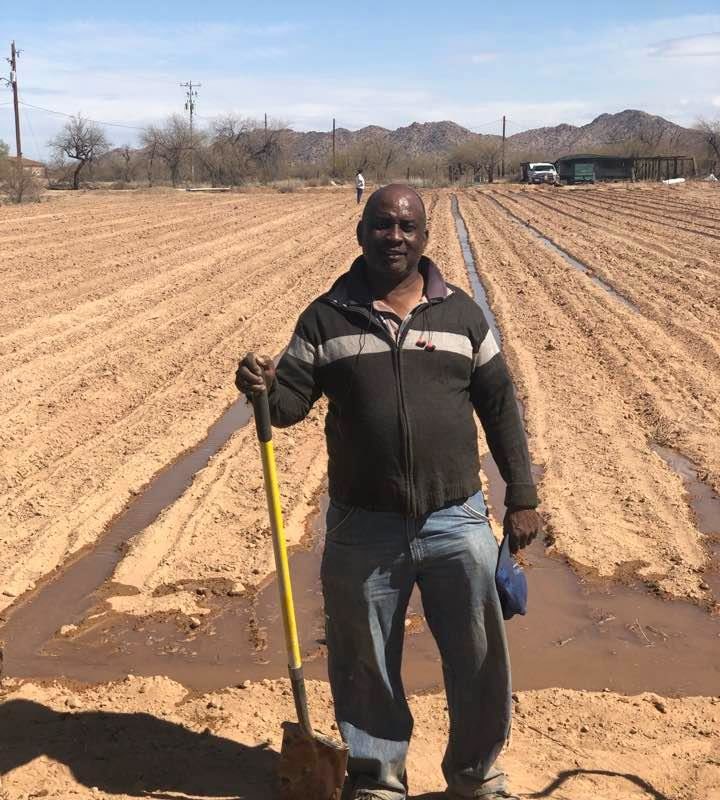Dennis Hudson Reclaims the Family Farm

by Farmer Frank Martin
Dennis Hudson was excited to show me his new well. “They just finished it,” he said, grinning.
The water was already flowing into the desert when Dennis showed me his new well. The water wasn’t going anywhere in particular, just out to an open desert. The dry ground popped as the
water rushed across, taking sticks and debris and sending small insects scurrying to higher ground. I couldn’t resist – I cupped my hand over the pipe and brought a handful of water to my mouth. It was cold and sweet.
Mobile, Arizona is known for having sweet water. I came here because my attorney said Dennis Hudson was a man I should meet . Mobile was originally a community where African Americans were relocated back in the very early 1930s. About 320 acres per family was deeded to some 60 Black Farmers, totaling 20,000 acres.
There were lots of hardships compounded by the Great Depression. Most of the work back then was still done by hand, horse or mule, since animals outnumbered tractors on farms until about 1945. Electricity was still a bit of a novelty too – the Rural Electrification Act, which brought electricity to rural farms, wasn’t signed until 1936. Even then, 90 percent of rural farms had no electricity – espe- cially in areas like Mobil.
The idea of getting 320 acres to farm must have sounded like a dream come true. Visions of cattle grazing, corn fields, fruit trees and chickens pecking around a big red barn would have enticed me too, but reality set in. The missing ingredient was water… the few canals in the area were still too far away.
Without any real irrigation system, the farmers were destined to fail. The US government failed on its prom- ises to bring water to the farmers. Still, the farmers persisted. There was a well a few miles away at the local school, which served as a gathering place for the community. The well was powered by a small three-and- a-half horsepower engine initially used to pump oil. Before it could be used to farm, water had to be hauled for drinking, bathing and gardening.
Dennis’ Great Grandfather Arthur H. Giles on his Grandmother Cynthia Giles’ side was the original home- steader. Arthur made this trip daily with a 300-gallon tank wagon pulled by mules. He hauled water for the rest of the community as best as he could. The land never reached its potential. Then the die back came, still no water. Slowly, totally exhausted, the farmers began retreating.
They couldn’t farm the land and began selling it off little by little in order to survive until it was all gone… that is, except for Dennis Hudson, last man standing. His farm was deeded down from his great grandfather, to his grandfather, to his father, and then to him.
There was another promise to drill a well for the farmers in the late 1960s from someone who can only be described as a modern day “Carpet Bagger.” Dennis’ grandfather Nathan Kinney gave up 50-plus acres to fund a community well. He lost the 50 acres and all rights to the well. The old well still remains north of the school but was grabbed up by another shyster many years ago. It was never used for its intended purpose.
One way or another Dennis’s family lost some 240 acres of the Mobil farm. Dennis has about 80 acres of the original farmstead left… and Dennis wants to farm. The Mobile farm has been fallow for thirty five to forty years now . Dennis has some memories of alfalfa growing on the farm- stead, some chickens and goats too. There was a well on the Hudson Farmstead at one time, but it gave out in the 1970s. It was powered by a repurposed gas engine. When the old original well failed, the alfalfa died and so did the garden, the chickens and goats were sold off. The desert reclaimed the farmland, creosote and scrub mesquite soon grew everywhere.
The new well is flowing now and the water that has been absent for almost 40 years is back on the farmstead again. We helped till the land and get it ready to plant. Dennis and his family planted the first 2 1/2 acres with sweet corn, cucumbers, summer squash, melons and beans around the second week in March. It’s coming up beautifully.
The best way to support Dennis right now is to donate money to his farm via Ajo Center for Sustainable Agriculture. To do so, visit ajocsa.com and click the ‘Donate’ button at the bottom of the page. Please leave a note to indicate that your donation is for Dennis Hudson.